- Home
- Elizabeth George
The Edge of the Shadows Page 15
The Edge of the Shadows Read online
Page 15
“You’re signed up for the SAT, yes?” Tatiana asked. “Then, you need to work on this essay. It needs to be good, Hayley, and as it stands right now—”
“She’ll be working on it,” Julie said. “She’s had a bit of trouble getting organized this year, but she’s back on track. Aren’t you, Hayley?”
Hayley said nothing, merely studying the floor and then finally looking up and giving a shrug.
Tatiana said, “Yes, I see,” rather slowly, and the way she said it told Hayley she was unconvinced. But she swung her chair around to her bookshelves and she fingered through the college catalogues there. She said, “You’ll find information online, too, Hayley. Let’s talk again next week and see if you’ve made any decisions.”
“That’s an excellent idea,” Julie Cartwright declared.
• • •
THEY SAID LITTLE to each other on the way home. Julie announced, “Not a word to your father” and “I know what you’re trying to do, Hayley.” To the first remark, Hayley puffed out a laugh between her lips and turned her face to the window. To the second she said nothing at all.
When they pulled up at the farmhouse, a car that neither Hayley nor her mom recognized was sitting in front of it. Hayley thought at once that something bad had happened, and she knew her mom was thinking the same thing. Julie slammed on the brakes of the old SUV and practically threw herself out of the vehicle. Hayley was following when the front door opened and Parker Natalia came out onto the porch.
Hayley’s dad was right behind him, laboring along with his walker. Parker held the screen door open for him and gave Hayley a casual wave that made him look like a regular visitor. Julie Cartwright murmured, “Who on earth . . . ?” and then Brooke came out of the house as well. She announced, “He’s here for Hayley,” in a way that made Hayley grow hot in the face. She quickly introduced Parker to her mom. He shook her hand, flashed his bright smile, and told them both that Bill Cartwright had invited him to wait. He had been driving along Smugglers Cove Road up to the state park for a hike when he saw the chicken barn with SMUGGLERS COVE FARM AND FLOWERS painted on its side. He’d remembered that was where Hayley lived, so he’d decided to stop by and say hi.
Bill Cartwright said, “Parker’s been keeping me entertained with tales of his misspent youth. Brooke too. Eh, Brooke?”
“Oh right. Whatever,” Brooke said. She slinked back into the house.
There was an awkward silence. Under different circumstances, the correct move would have been to keep Parker Natalia away from her father since no one on the island besides family knew exactly what condition he was in other than his doctor and Seth. But Parker himself had preempted that move, so Hayley wasn’t sure what to do.
Parker took care of this by saying, “Nice pond up behind the big barn,” in a way that suggested a walk to the pond was what he had in mind.
Julie Cartwright said it would be a fine idea for Hayley to take Parker up to it to check it out, especially since it was a completely gorgeous autumn day, and her way of speaking suggested that Hayley get Parker out of her father’s company.
Hayley wanted to say, “As if, Mom,” because obviously Parker had eyes and could see that her dad was ill. But instead she said, “Right,” and told Parker to follow her.
They walked past the barn in silence until Parker commented that the farm was awesome. Hayley said it was mostly work. Parker said still, it had to be nice to have so much land. There was nothing like this in Nelson. Nelson climbed steeply up from Lake Kootenay on its way into the mountains. No one had space to spread out anywhere.
“Just into the forest with the moose and the grizzlies,” he said with a smile.
She smiled in turn. He seemed encouraged by this because then he started to talk for real. He began by saying, “Listen, Hayley, I’ve got caught up in something and I’m not sure how it happened.”
Hayley thought he meant something illegal, and she couldn’t figure out why he’d talk to her about it. But then he went on, and things got clear.
He said, “Isis Martin called me one night and asked if I wanted to listen to some music at that pub in Langley. She billed this place as an English pub and asked if I wanted to see it. I said sure because I wasn’t doing anything, so we went.”
They’d reached the pond. Hayley figured there was no point in indicating its various beauties, which were limited. The perfect blue sky and some dazzling cumulous clouds were reflected in the water, but what did it matter since seeing the pond had obviously just been an excuse?
Parker was continuing. “I don’t think I gave her any ideas that night, but before I knew it, we were more or less a couple.”
Hayley cast a look his way and said, “Except you sort of did.”
“Did what?”
“Give her an idea.” When he looked blank, she continued with, “At the Djangofest concert at the high school? At intermission?”
At this, he looked extremely flustered. He colored deeply. He swallowed. “What about intermission?”
“You went outside? So did she? She followed you out and you guys—”
“I don’t remember that.”
Hayley thought that was hardly a credible answer, sort of like a criminal saying “I don’t recall” in court as a way of not lying directly about something. She said, “Well, she came back pretty much glowing and she said . . .” Hayley suddenly didn’t want to go on as she remembered what Isis had said and why Isis had followed the Canadian in the first place.
He said, “What? Because what I remember is that I went outside to have a smoke. I always get nervous before I play.”
She shot him a look that said like I almost believe you. But then what did it matter what she believed? She said, “Look. Isis was sure you’re gay—”
“I’m not—”
“—so she went outside to prove it. When she came back in, she laughed and said she was way wrong. I assumed you and her . . . Course, maybe she saw you with someone else, but what does it matter anyway?”
He said, “Me and someone else? No way. Anyway . . . this is gonna sound all . . . I dunno . . . but maybe she decided she wanted to hook up with me later and she was laying her claim in advance to keep you from . . . whatever.”
Hayley saw that he was going even redder in the face, and she had to admit that she found his embarrassment rather endearing. She found him appealing. And who wouldn’t, with his glossy hair curling around his head, his dynamite smile, and his air of being just a little dangerous compared to the boys on Whidbey Island?
He ran his hand back through that beautiful hair and he said, “Look, I need to say this. When I got introduced to you, I sort of . . . This is really awkward.”
He seemed to be waiting for Hayley to say something, but what it was she was supposed to say, she didn’t know.
He went on. “I looked at her Facebook page. She’s got something like twenty pictures of her and me. Whenever I see her, she’s got her iPhone and she’s taking pictures and the next thing I know, there I am on her page. I don’t get why she’s doing this because I haven’t exactly—”
“I think it might be Brady,” Hayley said, deciding to put Parker out of his misery. She explained the breakup Isis had gone through with her boyfriend in Palo Alto. “She doesn’t want to look dumped. But then, who does?”
He looked enormously relieved. He said, “Oh. That’s better.” Then he gazed at her with his deep brown eyes warm and said meaningfully, “I bet you’ve never been dumped, Hayley.”
It was Hayley’s turn to color, and she felt from the heat on her face that she was going as red as a birthday balloon. “Everyone’s been dumped.”
“I don’t think so.” He gazed away from her to the pond for a moment and seemed to be gathering his thoughts. He turned back to her and said in a rush, “I want a chance.”
“To dump me?”
He laugh
ed. “Boy, I said that wrong. I meant a chance to go out with you. I felt something when I met you and . . . well . . . I think you felt it too. What d’you say?”
Hayley wasn’t unaware of the compliment Parker Natalia was paying her. It was twofold. There was the compliment spoken by the attraction of a dazzling young man to her. There was also the compliment of his honesty about the attraction. The second of the two—that honesty—was seriously compelling.
“I say okay,” she told him with a smile.
TWENTY-SIX
Seth decided to do a little checking on Parker Natalia once Hayley told him that the Canadian had tracked her down on the farm. On his way to do a hike or something at South Whidbey State Park, the young man had claimed. But when Hayley included the information that Parker had also wanted her advice about getting clear of Isis Martin, Seth had his doubts. Something definitely didn’t feel right about that one. Parker hadn’t exactly been fighting Isis off with a whip and a chair.
If Parker was setting Hayley up for something, Seth wanted to protect her from the dude. That was what he told himself when he made the phone call to a number in Canada associated with BC Django 21. It turned out the number belonged to the bass player, a guy called David Wilkie.
Seth used music as his excuse, and it was helpful that David Wilkie had been in the audience at South Whidbey High School when Triple Threat had played. So he’d seen Parker Natalia playing with the group, and he wasn’t suspicious when Seth asked him about the fiddler. Seth said that Triple Threat was thinking of taking Parker on permanently. He said he was calling to see if the Canadian was reliable.
David’s answer was forthright but his tone was not. He said, “Oh he’s reliable, all right.”
“Meaning what?” Seth asked.
“Meaning he’ll turn up for rehearsals and he’ll turn up for gigs. He’s a great fiddler. Well, you heard that yourself.”
“And?” Seth said. “He says you guys dumped him for another fiddler. So if he was reliable and great and all that . . . ?”
“Hey, look. I don’t want to bad-mouth the dude. Just watch him, okay?”
“Why?”
“Because sometimes he’s trouble. I don’t want to say more. Maybe he’s changed. Just watch him.”
That set off all kinds of alarms. Seth wanted to know what David Wilkie meant. So he tried to probe, but all he learned was that BC Django 21 played regular gigs in Nelson, in nearby Castlegar, in Trail, and as far away as Kelowna, Kamloops, and Vernon. They were building a real following in B.C., and they would’ve liked to include Parker but “things didn’t go that way.” Plus . . . well, he started messing around with their mandolin player’s little sister and “Really, dude, that’s all I want to say.” Then he added ominously, “Look at it this way. He’s one hell of a musician and there’s no question about it. But the deal is this: You’re probably setting yourself up for trouble in more ways than one if you make him part of your group. That’s all.”
That, Seth decided, was more than enough.
TWENTY-SEVEN
“Restriction.” Derric said this to the lunch table in general as they compared notes on the fallout from the Maxwelton party. “A month and ‘you’re lucky it’s not longer but your mom thinks a month’ . . . blah blah blah.” He unwrapped a ham sandwich and tossed the plastic into the center of the table.
Jenn McDaniels said, “That’s harsh. But it’s definitely better than having your mom read the story of Sodom and Gomorrah to you. Twice, by the way. Like any day now I’m gonna turn into a pillar of salt. Ha. She should be so lucky.” She took a bite of her PBJ sandwich and said to Squat, “What about you?”
“I’m becoming my brother,” Squat informed them. He grabbed a carrot stick out of Jenn’s meager supply and used it to pretend he was smoking a joint. “Bunch of crying. Bunch more of ‘I’m a failure as a mother.’”
“Harsher,” Jenn said.
“An appointment with Ms. Tatiana and my mom,” Hayley said.
“Harshest of all!” Jenn said, and then to Becca, “Bet you faced tea and cookies at Mrs. Kinsale’s, didn’t you?”
Becca said, “As if,” and everyone began to give her a bad time until she went on with, “Okay, okay. But it was waffles,” as a way to keep them at a distance from the conversation she’d had with Diana Kinsale in the aftermath of the Maxwelton party.
She needn’t have worried. Isis Martin took up the reins of the conversation. They were at their regular lunch table, and from what Becca could hear around them in the New Commons, the Maxwelton party along with the fire was the topic of conversation. This wasn’t surprising since so many of the kids sitting nearby had showed up at the party. And that, it turned out, was what Isis Martin wanted to talk about.
“I didn’t tell anyone about that party,” she declared. “And you’d think I committed some major crime against humanity. Grandam was spitting bullets the whole next day. She called my mom and went on and on. You’d think we’d murdered someone.”
There was a moment of silence. Hayley was the one to say, “Someone did die, Isis.”
Isis covered her mouth with her hand. Then she said, “I didn’t mean . . . But the fire started after we were rounded up. It was just a coincidence that someone was camping in that shack. Even Grandam said that and she was ready to accuse us of everything she could think of.”
“Do they know who he was?” Becca turned to Derric, who’d be the most likely person to know, considering his dad’s job.
“Turned out to be a longtime druggie from Oak Harbor,” he told them. “He assaulted both his parents ’bout three months ago, then took off, and the cops’ve been looking for him ever since.”
“Loser,” Jenn said.
“He didn’t deserve to die,” Hayley said quietly.
“I’m not saying he deserved it,” Jenn said. “I’m just saying he was a loser. He lit an illegal fire inside that place.”
“But so did we,” Becca pointed out.
“Our fire wasn’t illegal. It was in a fire pit.”
“You know what I mean.”
They were all quiet again until Isis spoke up, saying, “Guys . . . you haven’t told anyone it was my idea, have you? We’re all in this together, aren’t we? No way did I intend the booze to be there. It was all just something to do, you know? Something to do on a Saturday night? It’s not like there’s any place else to go or anything else to do and I meant that in the best possible way and I wasn’t even drunk. Were you?”
They all looked at each other incredulously. Jenn said, “Whatever,” and stuffed half of her PBJ into her lunch bag. She said, “I’m outa here,” and in very short order, the rest of the kids decided they were, too.
• • •
DERRIC’S FOOTSTEPS WERE slow as he and Becca walked to her next class. His arm around her shoulders was heavy. At her classroom door, he drew her to one side and told her what was wrong. “It’s worse than restriction. I didn’t want to say.”
Becca felt a rush of fear. “What?”
“She made me an appointment with a shrink,” he told her. “She says it’s time they all ‘get to the bottom’ of what’s going on with me. She was all ‘you haven’t been yourself in months and this is the limit.’ She meant the party.”
Becca put her hand on his smooth cheek. “I’m sorry,” she told him. “But it could . . . It could be a good thing.”
“Nope. It couldn’t,” he replied. “There’s not a single way it could be good.”
She didn’t argue. Instead, she pulled him down to her and kissed him. She thought about loving someone the way she loved this boy and how loving someone sometimes meant letting them find the path they needed to take.
• • •
BECCA TOLD HERSELF that just because she was going to find out what had happened to Rejoice, it didn’t mean she would have to do anything with the information. A phone cal
l to Derric’s church in the guise of having to do a report for one of her classes was enough to get her the name of the orphanage that Derric had come from: Children’s Hope of Kampala. From there, she had to get her hands on a computer, and this was something she didn’t want to do at school.
South Whidbey Commons wasn’t a safe place since she didn’t want to be seen by one of the many kids who gathered there in the afternoons. So she went to the city library, a cottage-like structure next to the city hall. Some sort of women’s reading group was meeting in a room that opened up off the stacks, but that was it as far as users went that afternoon. No one was sitting at the computers, so she logged on and started her search for news of Children’s Hope of Kampala and how one might discover the whereabouts of one of its orphans.
What she did discover gave her pause. The orphanage where Derric and his sister had lived had closed its doors. And the closing seemed to be permanent. She was about to follow a link to learn more when she heard, “Art class again?” at her shoulder.
She looked around. There stood Aidan Martin yet again, and his expression was so smug that Becca felt infuriated. She snapped, “What is it with you? Every time I’m working on the Internet, you turn up and it’s getting creepy. Are you a stalker or something?” She jerked her ear bud from her ear and heard if she wasn’t such a poser.
Aidan smiled, apparently unoffended by being called a stalker. Becca saw why in a second when he flipped open his chemistry books and pulled a folded piece of paper from it. This he unfolded and placed over the computer’s keyboard. It was one of the Have You Seen This Woman flyers.
Becca said nothing although fear shot through her. Aidan put down his backpack and rustled through it till he came up with the front section of a newspaper. She saw that this was the Everett Herald, from the closest large town on the mainland. He handed it to her and said, “Page five,” and although she knew what she was probably going to find there, she cooperated. Her heart started break dancing.
She saw that the paper, like the South Whidbey Record, had the story about Laurel Armstrong and her daughter, Hannah. The paper was running it, just like the Record, with the same pictures that the Record had used. Not for the first time, Becca felt the walls closing in on her. But she swore she wouldn’t give in to this kid and whatever it was that he wanted from her. So she looked at the story and then at him. “So what?” she said.

 Well-Schooled in Murder
Well-Schooled in Murder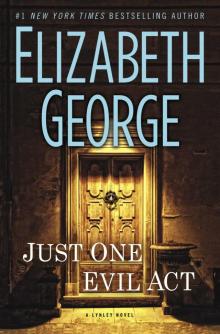 Just One Evil Act
Just One Evil Act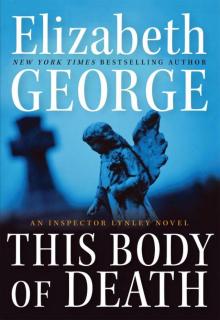 This Body of Death
This Body of Death The Edge of the Water
The Edge of the Water For the Sake of Elena
For the Sake of Elena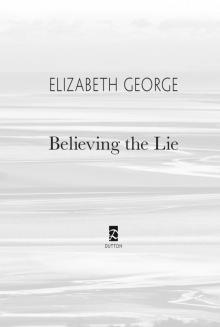 Believing the Lie
Believing the Lie The Edge of the Shadows
The Edge of the Shadows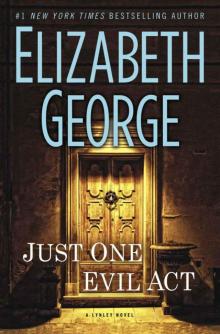 Just One Evil Act: A Lynley Novel
Just One Evil Act: A Lynley Novel In Pursuit of the Proper Sinner
In Pursuit of the Proper Sinner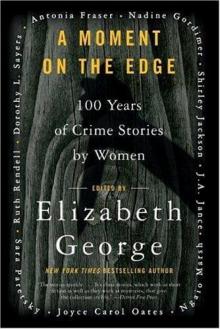 A Moment on the Edge:100 Years of Crime Stories by women
A Moment on the Edge:100 Years of Crime Stories by women Elizabeth I
Elizabeth I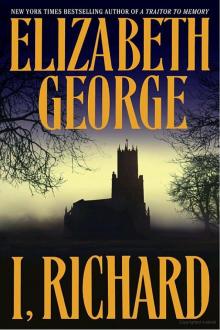 I, Richard
I, Richard A Traitor to Memory
A Traitor to Memory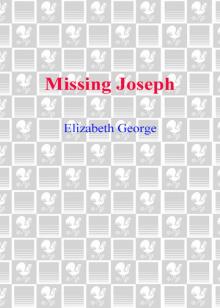 Missing Joseph
Missing Joseph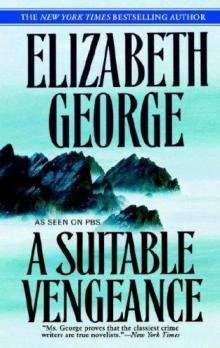 A Suitable Vengeance
A Suitable Vengeance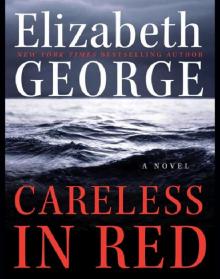 Careless in Red
Careless in Red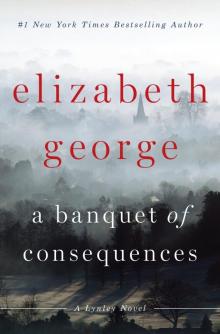 A Banquet of Consequences
A Banquet of Consequences Playing for the Ashes
Playing for the Ashes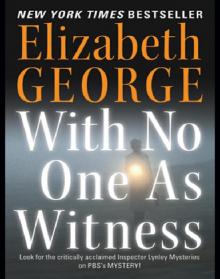 With No One As Witness
With No One As Witness Deception on His Mind
Deception on His Mind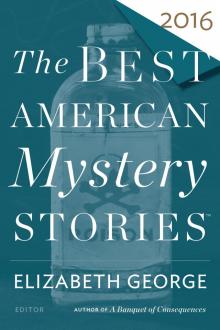 The Best American Mystery Stories 2016
The Best American Mystery Stories 2016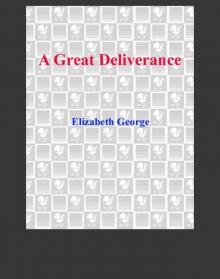 A Great Deliverance
A Great Deliverance In the Presence of the Enemy
In the Presence of the Enemy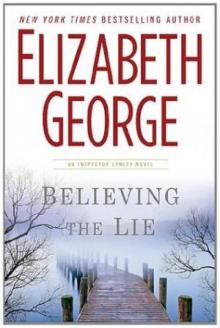 Believing the Lie il-17
Believing the Lie il-17 The Edge of the Light
The Edge of the Light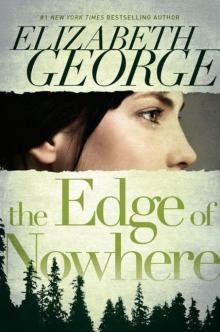 SW01 - The Edge of Nowhere
SW01 - The Edge of Nowhere A Place of Hiding
A Place of Hiding What Came Before He Shot Her il-14
What Came Before He Shot Her il-14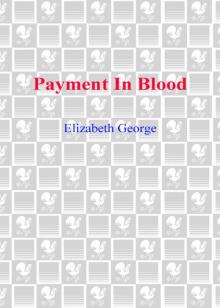 Payment In Blood
Payment In Blood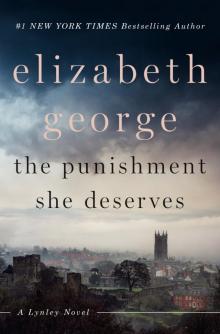 The Punishment She Deserves
The Punishment She Deserves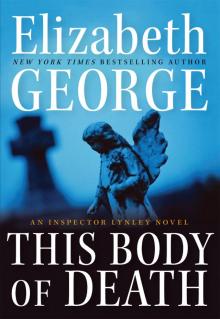 This Body of Death: An Inspector Lynley Novel
This Body of Death: An Inspector Lynley Novel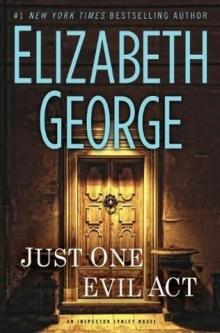 Just One Evil Act il-18
Just One Evil Act il-18 What Came Before He Shot Her
What Came Before He Shot Her Missing Joseph il-6
Missing Joseph il-6